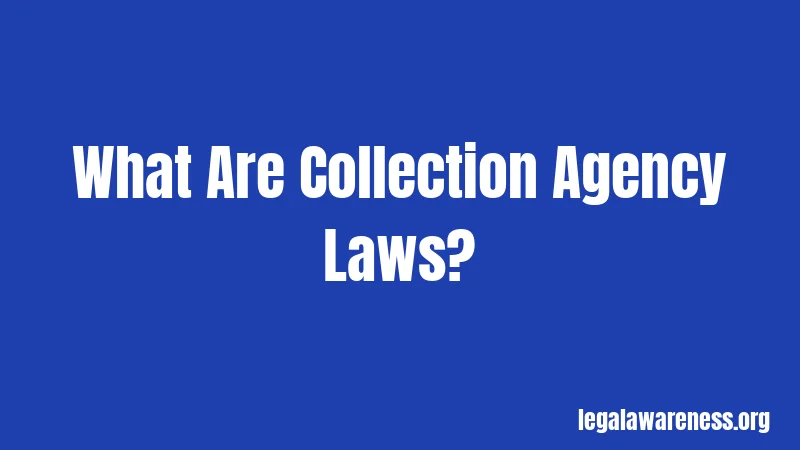Collection Agency Laws in Pennsylvania (2026): Your Rights Against Harassment
Most people don’t realize how strict Pennsylvania’s debt collection laws actually are. Seriously. If you’re getting calls from collection agencies, you have way more protection than you think. Let’s break down exactly what these companies can and can’t do in Pennsylvania.
Here’s the deal. Pennsylvania has some of the strongest consumer protections in the country. The state laws work together with federal rules to stop abusive collection practices. You deserve to know your rights.
What Are Collection Agency Laws?

Collection agency laws control how debt collectors can contact you. These rules exist to protect you from harassment and unfair tactics.
In Pennsylvania, collection agencies must follow three main sets of rules. First, there’s the federal Fair Debt Collection Practices Act (FDCPA). This applies nationwide. Second, Pennsylvania has the Fair Credit Extension Uniformity Act (FCEUA). Third, there’s the Unfair Trade Practices and Consumer Protection Law (UTPCPL).
The FCEUA is pretty unique. Most states only regulate third-party debt collectors. Pennsylvania regulates both third-party collectors AND original creditors. That means your credit card company has to follow the same rules as a collection agency.
When Collection Agencies Can Contact You
Wondering if those late-night calls are legal? They’re not.
Debt collectors in Pennsylvania can only call you between 8 AM and 9 PM. Any calls outside those hours break the law. Period.
They also can’t call you at work if your employer doesn’t allow it. You need to tell them in writing that your boss prohibits collection calls. Keep a copy of that letter.
Stay with me here. Collectors also can’t send you emails at addresses they know are provided by your employer. They can’t contact you through social media if the message is publicly viewable. These rules protect your privacy at work.
What Debt Collectors Cannot Do

Collection agencies in Pennsylvania face strict limits on their behavior. Breaking these rules can cost them serious money.
They cannot threaten you with violence. They can’t use profane or abusive language. Basically, if they’re cursing at you or making threats, they’re breaking the law.
Collectors can’t lie to you about the debt amount. They can’t claim to be lawyers if they’re not. They can’t send you fake legal documents that look like court papers.
Here’s one that surprises most people. Collectors can’t try to collect more money than you actually owe. Unless your original contract says they can charge extra fees, or state law allows it, they can’t add random charges.
They also can’t tell your family, friends, or coworkers about your debt. If a collector tells your neighbor you owe money, that’s a violation. They can contact other people only to get your phone number or address. That’s it.
The Four-Year Statute of Limitations
This part is huge. Honestly, this is the most important rule most people don’t know about.
Pennsylvania has a four-year statute of limitations on debt. This covers credit cards, medical bills, personal loans, and most other debts. The clock starts from your last payment or when you defaulted.
Wait, it gets better. If four years have passed, collectors can’t sue you in court. The debt becomes “time-barred.” They might still try to collect it, but they can’t take legal action.
Some collectors are pretty sneaky about this. They might ask you to make a small “good faith” payment. Don’t do it. Making even a $10 payment restarts the four-year clock. Seriously, don’t fall for this trick.
Sound complicated? It’s actually not. Just remember: four years from your last payment means they can’t sue.
What About Original Creditors?

Most people assume these laws only apply to collection agencies. They’re wrong.
Pennsylvania’s FCEUA applies to original creditors too. Your credit card company, hospital, or whoever you originally owed money to must follow the same rules. This makes Pennsylvania different from most other states.
The federal FDCPA only covers third-party collectors. But Pennsylvania went further. Original creditors in Pennsylvania can’t harass you any more than collection agencies can.
If your credit card company calls you at 10 PM, that’s a violation. If they lie about what you owe, that’s a violation. Same rules apply to everyone.
Penalties for Breaking the Law
Debt collectors who violate these laws face real consequences. You can actually sue them and win money.
Under the FDCPA, you can get up to $1,000 in damages per lawsuit. You don’t need to prove you were harmed. You just need to show they broke the law. Plus, the collector has to pay your attorney fees and court costs if you win.
Hold on, this part is important. Under Pennsylvania’s UTPCPL, you can get even more. If you suffered actual financial losses from a violation, you can sue for triple damages. That means three times what you lost, plus attorney fees.
Let’s say a collector illegally charged you $500 in fees. You could potentially get $1,500 back (three times $500), plus all your legal costs covered. Pretty straightforward.
The time limit for suing is different for state and federal laws. You have one year under the FDCPA. You have two years under Pennsylvania state law. Don’t wait too long.
How to Stop Collection Calls
You have the power to stop collection agencies from calling you. Literally.
Send them a written letter telling them to stop contacting you. This is called a “cease and desist” letter. Once they get it, they can only contact you to confirm they’re stopping or to tell you about specific legal action.
Here’s what you need to know. This only works for third-party collection agencies. Original creditors don’t have to stop contacting you. But they still can’t harass you.
Make sure you send the letter by certified mail. Get proof they received it. Keep copies of everything. This matters if you need to prove they violated the law later.
Wage Garnishment in Pennsylvania
Most people worry about wage garnishment. Good news here.
Pennsylvania generally doesn’t allow wage garnishment for credit card debt, medical bills, or personal loans. Debt collectors can’t take money directly from your paycheck for these debts. That’s right, they can’t.
There are exceptions. The government can garnish wages for taxes, student loans, and child support. Landlords can garnish for unpaid rent. But regular creditors can’t.
If a collector threatens wage garnishment for credit card debt, they’re breaking the law. Report them immediately.
What Collectors Can Do After Getting a Judgment
Confused about the difference? Let me break it down.
If a collector sues you and wins, they get a court judgment. Once they have a judgment, different rules apply. The four-year statute of limitations no longer protects you.
Judgments in Pennsylvania basically last forever. They become a lien on any real estate you own in that county. This can cause problems when you try to sell property.
With a judgment, collectors can go after your bank account. They can attach your personal property. They still can’t garnish wages for most debts, though.
Protected Property and Income
Some of your money and property is protected from debt collectors. Even with a judgment.
Social Security benefits are exempt. So are unemployment benefits, veteran’s benefits, and most retirement accounts like 401(k)s and pensions. Collectors can’t touch these.
Here’s something interesting. If you’re married and own property jointly with your spouse, that property might be protected from your individual creditors. Pennsylvania law calls this “tenancy by the entireties.” Basically, if only one spouse owes the debt, jointly owned property stays safe.
Most public benefits stay protected even after they’re deposited in your bank account. Keep these in a separate account from other money if possible.
How to Verify a Debt
You’re not alone, this confuses a lot of people.
When a collector first contacts you, they must send you a written validation notice within five days. This notice must include the amount you owe, the creditor’s name, and your rights to dispute the debt.
You have 30 days to dispute the debt in writing. If you do, the collector must stop collection efforts until they send you proof you owe the money. This is your right under federal law.
Don’t ignore this step. Many collection agencies buy old debts for pennies on the dollar. Sometimes they have wrong information about what you owe or whether you even owe it.
Filing a Complaint
Think a debt collector broke the law? You have options.
You can file a complaint with the Pennsylvania Attorney General’s office. They handle consumer protection issues. You can also complain to the Consumer Financial Protection Bureau (CFPB) or the Federal Trade Commission (FTC).
These agencies investigate violations. They can take action against collectors who break the rules repeatedly.
You can also sue the collector yourself. Many consumer attorneys handle these cases on a contingency basis. That means they only get paid if you win. The law requires the collector to pay your attorney fees if you prove they violated the FDCPA.
Collection Agency Licensing
Pennsylvania is different from many states. The state doesn’t require collection agencies to have a special license just to collect debts.
That said, collection agencies still need to register with the Pennsylvania Department of State. They need a certificate of authority to do business in Pennsylvania. But there’s no separate “collection agency license” like in some other states.
This doesn’t mean agencies can do whatever they want. They still must follow all federal and state collection laws. The penalties for breaking these laws apply whether they’re licensed or not.
Recent Changes and Updates
Pennsylvania’s main debt collection laws have been in place since 2000. The FCEUA became effective on June 26, 2000.
But federal rules changed recently. In 2021, the CFPB updated regulations about how collectors can contact you. They can now send emails and text messages, but they must follow specific rules. You can opt out of electronic communications.
Collectors must include clear information about opting out of emails and texts. They can’t send messages that look like they’re from someone else. Transparency matters.
What to Do If You’re Being Sued
Don’t panic. You may be able to respond on your own.
First, never ignore a lawsuit. If you don’t respond, the collector wins by default. You have to file an answer to the lawsuit.
The statute of limitations is a powerful defense. If the debt is more than four years old from your last payment, you can argue it’s time-barred. You must raise this defense in your answer.
Consider talking to an attorney. Many offer free consultations. Legal aid organizations help low-income residents for free or at reduced cost. Pennsylvania has several legal aid offices throughout the state.
Your Rights During Court Proceedings
If a debt collector takes you to court, you still have rights. Totally.
You have the right to see the evidence they have against you. Request documentation that proves you owe the debt. Make them prove their case.
Many collection lawsuits get dismissed because the collector can’t prove the debt. They often buy debts without getting proper documentation. Make them work for it.
You can negotiate a settlement even after being sued. You might be able to pay less than the full amount. Get any settlement agreement in writing before you pay anything.
Getting Help
Don’t worry, we’ll break down step by step where to get help.
Pennsylvania has several legal aid organizations. Community Legal Services serves Philadelphia residents. Legal Aid of Southeastern Pennsylvania covers Bucks, Montgomery, Chester, and Delaware counties. MidPenn Legal Services handles central Pennsylvania.
These organizations provide free or low-cost help to people who qualify. They can help you fight back against unfair collection practices.
You can also find consumer attorneys who specialize in debt collection defense. Many work on contingency, especially for FDCPA violation cases.
Frequently Asked Questions
Can a debt collector call me at work? Not if your employer prohibits it. Tell the collector in writing that your workplace doesn’t allow these calls. They must stop calling you there.
How long can a debt collector try to collect a debt? They can try forever, but they can only sue you within four years of your last payment. After that, the debt is time-barred.
What if I don’t recognize the debt? Dispute it in writing within 30 days. The collector must send you proof. Don’t assume they have the right person or the right amount.
Can collectors contact my family about my debt? Only to get your contact information. They can’t discuss your debt with anyone except you, your spouse, or your attorney.
What’s the difference between a creditor and a debt collector? A creditor is who you originally owed money to. A debt collector is a third party hired to collect the debt or who bought your debt. Pennsylvania law applies to both.
Final Thoughts
Now you know the basics. Pennsylvania gives you strong protection against abusive debt collectors. The laws apply to both collection agencies and original creditors.
Remember the four-year rule. Know when to dispute a debt. Don’t let collectors bully you into paying debts you don’t owe or that are too old to sue on.
If a collector breaks the law, you can fight back. You might even get money damages. Stay informed, document everything, and get help if you need it.
References
- Pennsylvania Fair Credit Extension Uniformity Act (FCEUA) – 73 P.S. § 2270.1 et seq. – https://www.attorneygeneral.gov/protect-yourself/consumer-advisories/fair-debt-collection-practices/
- Pennsylvania Unfair Trade Practices and Consumer Protection Law (UTPCPL) – 73 P.S. § 201-1 et seq. – https://www.legislature.state.pa.us/
- Fair Debt Collection Practices Act (FDCPA) – 15 U.S.C. § 1692 et seq. – https://www.ftc.gov/legal-library/browse/rules/fair-debt-collection-practices-act-text
- Pennsylvania Attorney General Consumer Protection – https://www.attorneygeneral.gov/protect-yourself/
- Upsolve Pennsylvania Debt Collection Laws Guide (Updated September 2025) – https://upsolve.org/learn/pennsylvania-debt-collection-laws/
